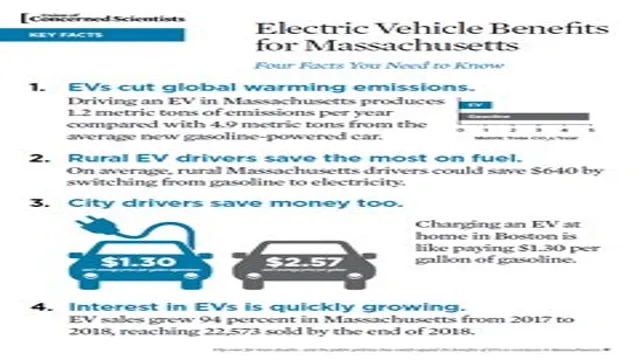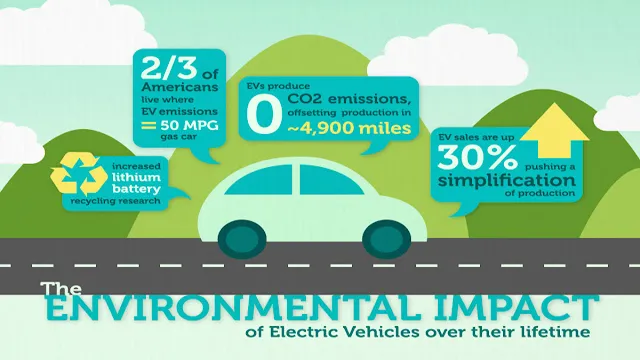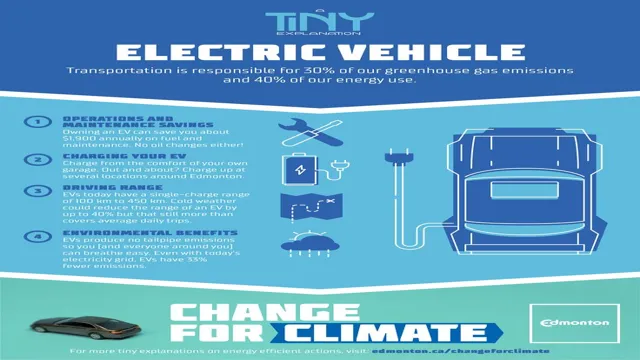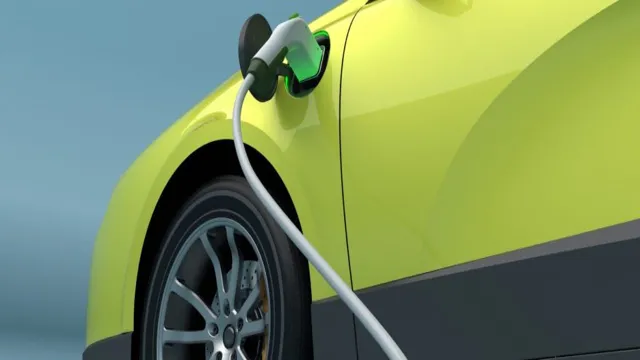Revolutionizing the Road: How Electric Cars are Transforming the Environment for the Better
Electric cars have been gaining a lot of attention in the automobile industry in recent times. These vehicles have revolutionized the way we drive, and it seems like they are here to stay. Perhaps you’re skeptical of them because they’re new and you don’t know what to expect.
Do you want to know why there’s so much hype around them? Well, buckle up because we’re about to go on an exciting ride into the world of electric cars. Think of it this way, electric cars are like smartphones that have replaced traditional flip phones. They’re modern, efficient, and environmentally friendly.
In the same way, electric cars use batteries instead of gasoline to power the vehicle, which helps reduce carbon emissions that harm the environment. So while you’re driving and enjoying the exceptional performance of the vehicle, you’ll also be reducing your carbon footprint. But what else makes electric cars unique? For starters, they offer fast acceleration, which means they can go from zero to sixty miles per hour in a matter of seconds.
Additionally, they have a low center of gravity, which makes the car less likely to roll over and handles curves like a champ. Moreover, electric cars create less noise and vibration compared to gasoline-powered cars, giving you a peaceful and smoother ride. If you’re still wondering whether electric cars are worth the hype, keep in mind that many car manufacturers are betting on them being the future of the auto industry.
They’re investing billions of dollars to produce high-quality electric cars that will surpass previous gasoline-powered designs. So it won’t be long until electric cars become the norm. Therefore, it’s worth it to join the bandwagon and experience what it feels like to drive a car of the future.
To sum it up, electric cars offer numerous benefits that traditional cars can’t match. They’re modern, efficient, eco-friendly, and fast. So why not join the future and get an electric car for yourself? Trust me; you won’t regret it.
Environmentally Friendly
Electric cars have become an increasingly popular option for environmentally-conscious individuals looking for a more sustainable form of transportation. One of the main benefits of electric cars on the environment is that they produce zero emissions. Unlike traditional gasoline-powered vehicles, electric cars run on electricity and produce no exhaust fumes.
This significantly reduces air pollution and improves overall air quality. Additionally, electric cars are more energy-efficient than gasoline cars, requiring less fuel to travel the same distance. This means that less energy is wasted during the transportation process, minimizing the carbon footprint associated with driving.
Finally, electric cars can be charged using renewable energy sources such as wind or solar power, further reducing their impact on the environment. Overall, electric cars offer a range of benefits for the environment and ultimately, the future of our planet.
Lower Emissions
Lowering emissions is becoming more crucial than ever for environmentally conscious individuals and businesses alike. By decreasing greenhouse gas emissions, we can help to reduce air pollution and ultimately, slow down the process of climate change. There are many ways to reduce emissions, such as utilizing renewable energy sources like wind or solar power, driving electric or hybrid cars, and using energy-efficient appliances.
These small adjustments to our lifestyle may seem insignificant, but when implemented collectively, they can make a significant impact on the environment. By making a conscious effort to become more eco-friendly, we can lower our carbon footprint and ensure a healthier planet for future generations. So why not take the leap and join the environmentally friendly movement today?

Reduced Pollution
Reduced pollution is one of the many benefits of environmentally friendly practices. By embracing eco-friendly habits, we can help make the world a better place and reduce the impact of our carbon footprint. One way we can all contribute is by reducing our reliance on single-use plastics.
These plastics remain in the environment for hundreds of years, polluting our oceans and harming marine life. By using reusable bags, bottles, and containers, we can significantly reduce the amount of plastic waste we produce. Additionally, choosing to walk, bike, or use public transport is another great way to reduce pollution.
By avoiding gas-powered vehicles, we can help reduce the number of harmful emissions that contribute to air pollution. With the rise of renewable energy, we also have the opportunity to support companies that prioritize sustainable practices. Whether it’s solar power or wind energy, these alternative options are an excellent way to reduce our carbon footprint and contribute to a cleaner, more sustainable future.
So, let’s all do our part and embrace environmentally friendly habits to reduce pollution and protect the planet.
Lower Carbon Footprint
Electric cars are becoming increasingly popular due to their significant environmental benefits. One of the greatest advantages of electric cars is that they have a lower carbon footprint than traditional gasoline-powered vehicles. This is primarily because electric cars rely on renewable energy sources such as solar and wind power, which produce no emissions.
Reduced emissions translate to lower greenhouse gas emissions, leading to significant improvements in air quality. Electric cars also produce significantly less noise pollution and save energy by regenerating power during braking. Additionally, electric cars require less maintenance because they have fewer moving parts; this means less waste, and fewer resources required to manufacture replacement parts.
By choosing to drive an electric car, you can significantly reduce your carbon footprint and play a role in protecting our planet for future generations.
Less Dependence on Fossil Fuels
As our planet faces the harsh realities of climate change, reducing our carbon footprint has become more crucial than ever. The burning of fossil fuels is one of the major factors contributing to greenhouse gas emissions, and as a result, the world is taking measures to reduce its dependence on them. Lowering our carbon footprint is necessary for the health of the planet, and moving towards clean energy is a step in the right direction.
By implementing renewable energy sources like wind and solar power, we can lower our dependence on fossil fuels, mitigate climate change, and safeguard our planet for future generations. It’s time to take action and make a difference.
Decreased Greenhouse Gas Emissions
Lower Carbon Footprint With the growing awareness surrounding climate change and the impact of greenhouse gas emissions, individuals and businesses alike are looking for ways to lower their carbon footprint. By making conscious choices about energy consumption, transportation, and resource use, we can significantly decrease the amount of carbon dioxide and other greenhouse gases released into the atmosphere. Small changes such as switching to energy-efficient light bulbs, reducing water usage, and choosing eco-friendly products can make a big impact over time.
Larger steps such as investing in renewable energy and implementing sustainable practices within businesses can also contribute to lowering carbon footprints. By taking action now, we can help protect our planet for future generations and create a more sustainable future.
Renewable Energy Opportunities
Renewable Energy Opportunities As our world becomes more conscious of the impact we have on the environment, it’s crucial to explore renewable energy opportunities to reduce our carbon footprint. Not only does this help the planet, but it also helps our wallets in the long run. Solar panels are becoming increasingly popular in residential homes as they allow homeowners to generate their own electricity while reducing their dependence on the grid.
Wind turbines have also become a common sight in many rural areas as they provide clean energy that can power entire communities. We can also explore hydroelectric power, which harnesses energy from flowing water, and geothermal energy, which utilizes the Earth’s natural heat. By investing in renewable energy opportunities, we not only decrease our carbon footprint but also create a more sustainable future for generations to come.
Social Benefits
Electric cars have numerous social benefits, with one of the most significant being their positive impact on the environment. Traditional petrol and diesel vehicles emit high levels of pollutants which can be harmful to the air and contribute to the ongoing issue of climate change. In contrast, electric cars produce zero emissions, making them a much cleaner alternative.
As a result, they not only help to reduce air pollution but also improve overall air quality. This benefits everyone, but especially those with respiratory conditions such as asthma and other health issues as well as the natural environment. Additionally, electric cars can help to reduce our dependence on non-renewable fossil fuels, thus moving us towards a more sustainable future.
By choosing electric cars for our daily commutes and errands, we can all do our part in contributing to a cleaner and healthier world for future generations.
Improved Health and Air Quality
Improved Health and Air Quality: Social Benefits When we think about the benefits of cleaner air, most people immediately think of environmental benefits. But did you know that improved air quality also has significant social benefits? First and foremost, improved air quality translates directly into improved public health. With cleaner air, we see reductions in respiratory diseases, asthma attacks, and premature deaths caused by air pollution.
This alone is a huge social benefit, as it means healthier, happier communities. Better air quality also leads to improved quality of life for people in urban areas. Without the smog and haze that often shrouds cities, people are more likely to enjoy outdoor activities and spend time outside.
This is particularly important for children, who benefit from physical activity and outdoor play. Clean air also means fewer missed work and school days due to illness caused by pollution. Moreover, there are economic benefits to cleaner air as well.
With fewer cases of illness, healthcare costs go down for individuals and governments. Additionally, cleaner air can lead to increased tourism, as people are more likely to visit cities with good air quality. All of these social, health, and economic benefits make reducing air pollution an important goal for both individuals and governments.
By making small changes in our daily lives, like choosing to bike or walk instead of driving, or using more energy-efficient appliances, we can all contribute to cleaner air and a better quality of life for our communities.
Reduced Noise Pollution
Reduced noise pollution brings social benefits that improve our well-being in many ways. Noise pollution from traffic, construction work, and industrial activity can cause stress, hearing damage, and sleep deprivation, affecting our physical and mental health. By reducing noise pollution, we can enjoy a more peaceful environment that promotes relaxation, concentration, and creativity.
Moreover, a quieter environment encourages social interaction and community engagement, as people feel more comfortable spending time outside and communicating with each other. Reduced noise pollution also benefits local wildlife, as noise can disturb their habitat and communication. Overall, reducing noise pollution is essential for maintaining a healthy and sustainable environment that fosters social well-being and human connection.
As we strive to create more livable and inclusive communities, reducing noise pollution should be one of our top priorities.
Economic Benefits
One of the major benefits of electric cars is their positive impact on the environment. These cars emit zero emissions, meaning they do not contribute to air pollution, which can have a detrimental effect on our health and the planet as a whole. Moreover, because electric cars are powered by electricity, they help to reduce our dependence on fossil fuels, which are a finite and non-renewable resource.
In addition to these environmental benefits, electric cars can also provide significant economic benefits. They can help to lower fuel costs, as electricity is generally less expensive than gasoline. Furthermore, electric cars require less maintenance than traditional gas-powered cars, which can help drivers save money in the long run.
Overall, the use of electric cars can help to create more sustainable and cost-effective transportation systems, while also reducing our environmental impact.
Conclusion
In conclusion, electric cars are not only stylish and modern, but they are also environmentally friendly. By reducing harmful emissions and creating a cleaner future, electric cars are paving the way to a better and brighter tomorrow. So, not only will you be the coolest cat on the block, but you can rest easy knowing that you are doing your part to protect our planet.
Truly, electric cars are a win-win for everyone involved, and who wouldn’t want to be a part of that?”
FAQs
How do electric cars benefit the environment?
Electric cars benefit the environment by producing no emissions during operation, reducing air pollution and greenhouse gases.
Are electric cars more environmentally friendly than gasoline cars?
Yes, electric cars are considered more environmentally friendly than gasoline cars because they emit far less pollutants.
Can electric cars help reduce the impact of climate change?
Yes, by reducing greenhouse gas emissions, electric cars can help slow the pace of climate change.
Are there any disadvantages of electric cars on the environment?
While electric cars are generally more environmentally friendly than gasoline cars, their production can still have an impact on the environment due to the mining and manufacturing of batteries and other components. However, this impact is generally smaller than that of gasoline cars.
How can the use of electric cars lead to a healthier environment?
The use of electric cars can lead to a healthier environment by reducing air pollution and improving air quality, which can have positive impacts on public health. Additionally, the use of renewable energy sources to power electric cars can further reduce emissions and promote a cleaner environment.






